新标准英语第一册2
外研社一起点小学新标准英语
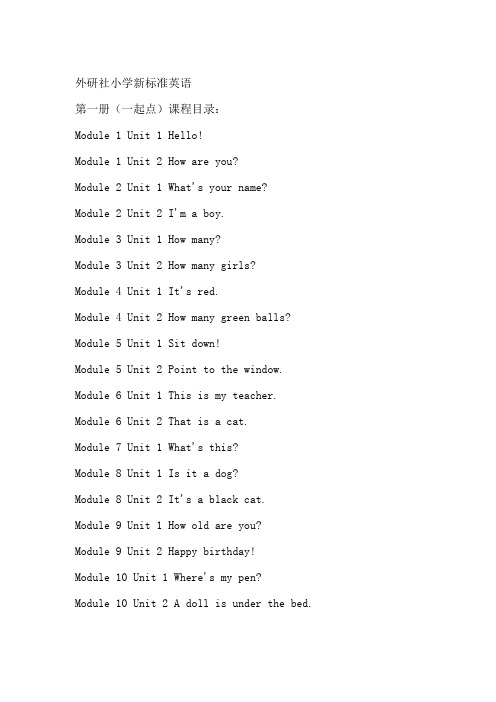
外研社小学新标准英语第一册(一起点)课程目录:Module 1 Unit 1 Hello!Module 1 Unit 2 How are you?Module 2 Unit 1 What's your name?Module 2 Unit 2 I'm a boy.Module 3 Unit 1 How many?Module 3 Unit 2 How many girls?Module 4 Unit 1 It's red.Module 4 Unit 2 How many green balls? Module 5 Unit 1 Sit down!Module 5 Unit 2 Point to the window. Module 6 Unit 1 This is my teacher. Module 6 Unit 2 That is a cat.Module 7 Unit 1 What's this?Module 8 Unit 1 Is it a dog?Module 8 Unit 2 It's a black cat.Module 9 Unit 1 How old are you?Module 9 Unit 2 Happy birthday!Module 10 Unit 1 Where's my pen?Module 10 Unit 2 A doll is under the bed.外研社小学新标准英语第二册(一起点)课程目录:Module 1 UNIT 1 Where's the cat?Module 1 UNIT 2 How many green birds? Module 2 UNIT 1 That is my father.Module 2 UNIT 2 He's a doctor.Module 3 UNIT 1 This is her bag.Module 3 UNIT 2 My mother is a nurse. Module 4 UNIT 1 This is my head.Module 4 UNIT 2 These are your legs.Module 5 UNIT 1 They're cows.Module 5 UNIT 2 It's thin.Module 6 UNIT 1 That snake is long.Module 6 UNIT 2 The baby lions are cute. Module 7 UNIT 1 Let's play football!Module 7 UNIT 2 Let's sing!Module 8 UNIT 1 I like football.Module 8 UNIT 2 What's your favourite sport? Module 9 UNIT 1 I don't like meat.Module 9 UNIT 2 I don't like ginger.Module 10 UNIT 1 Do you like dolls?Module 10 UNIT 2 Do they like jigsaws?REVIEW MODULE UNIT 1 He's a driver.REVIEW MODULE UNIT 2 It's small.Reading for Pleasure外研社小学新标准英语第三册(一起点)课程目录:Module 1 UNIT 1 I like the ABC song.Module 1 UNIT 2 What do you like?Module 2 UNIT 1 He likes this T-shirt.Module 2 UNIT 2 He doesn't like this shirt.Module 3 UNIT 1 We have English in the morning. Module 3 UNIT 2 I like PE.Module 4 UNIT 1 It's 2 o'clock.Module 4 UNIT 2 What's the time?Module 5 UNIT 1 I get up at 7 o'clock in the morning. Module 5 UNIT 2 It's half past 7.Module 6 UNIT 1 She watches TV.Module 6 UNIT 2 Does he play the flute?Module 7 UNIT 1 What do you do at the weekend? Module 7 UNIT 2 Where do you live?Module 8 UNIT 1 How do you go to school?Module 8 UNIT 2 I go by train.Module 9 UNIT 1 It's winter.Module 9 UNIT 2 It's warm.Module 10 UNIT 1 Happy New Year!Module 10 UNIT 2 We have Christmas.REVIEW MODULE UNIT 1 What's the time, Mr Wolf? REVIEW MODULE UNIT 2 Does Amy like English? REVIEW MODULEReading for pleasure It's under the desk。
新标准英语一起二年级上册Module1Unit2教案
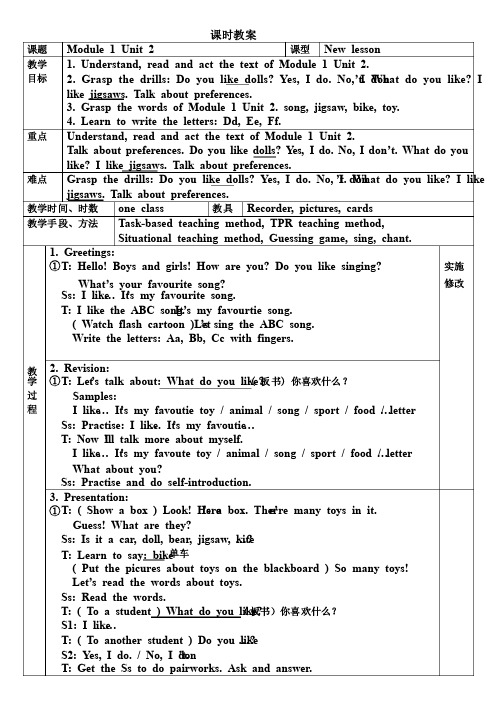
课时教案课题 Module 1 Unit 2 课型 New lesson 教学 目标 1. Understand, read and act the text of Module 1 Unit 2. 2. Grasp the drills: Do you like dolls? Yes, I do. No, I don ’t. What do you like? I like jigsaws. Talk about preferences. 3. Grasp the words of Module 1 Unit 2. song, jigsaw, bike, toy. 4. Learn to write the letters: Dd, Ee, Ff. 重点 Understand, read and act the text of Module 1 Unit 2. Talk Talk about about about preferences. preferences. preferences. Do Do Do you you you like like like dolls? dolls? dolls? Y es, Y es, I I I do. do. do. No, No, No, I I I don don don’’t. t. What What What do do do you you like? I like jigsaws. Talk about preferences. 难点 Grasp the drills: Do you like dolls? Yes, I do. No, I don’t. What do you like? I like jigsaws. Talk about preferences. 教学时间、时数 one class 教具 Recorder, pictures, cards 教学手段、方法 Task-based teaching method, TPR teaching method, Situational teaching method, Guessing game, sing, chant. 教 学 过 程 1. Greetings: ①T: Hello! Boys and girls! How are you? Do you like singing? What What’’s your favourite song? Ss: I like … It ’s my favourite song. T: I like the ABC song. It’It’s my favourtie song. s my favourtie song. ( Watch flash cartoon )Let ’s sing the ABC song. Write the letters: Aa, Bb, Cc with fingers. 实施 修改 2. Revision: ①T: Let ’s talk about: What do you like? ( 板书) 你喜欢什么?Samples: I like … It ’s my favoutie toy / animal / song / sport / food / letter …Ss: Practise: I like… It ’s my favoutie … T: Now I ’ll talk more about myself. I like… It ’s my favoute toy / animal / song / sport / food / letter … What about you? Ss: Practise and do self-introduction. 3. Presentation: ①T: ( Show a box ) Look! Here ’s a box. Ther e’e’re many toys in it. re many toys in it. Guess! What are they? Ss: Is it a car, doll, bear, jigsaw, kite …? T: Learn to say: bike 单车 ( Put the picures about toys on the blackboard ) So many toys! Let Let’’s read the words about toys. Ss: Read the words. T: ( To a student ) What do you like?(板书)你喜欢什么? S1: I like … T: ( To another student ) Do you like …? S2: Yes, I do. / No, I don ’t. T: Get the Ss to do pairworks. Ask and answer. What do you like? I like… Do you like … Yes, I do. / No, I don ’t.Ss: Do pairworks. ②T: ( Show Panpan and Baby panda ) Who are they?This is Panpan and this is Baby panda.Let ’s listen to a story about Panpan and Baby panda.Where are Panpan and Baby panda?Ss: They ’re in a toy shop. T: What can you see in the toy shop? How many …? Ss: I can see … T: Listen and repeat the story. Then answer my questions. Does Panpan like dolls?Ss: No, he doesn ’t. T: What does Panpan like?Ss: He likes jiasaw. And he likes his bike. T: What does Baby panda like? Ss: He likes pandas, toy pandas. T: Get the Ss to read and act out the text of M 1 U2.4. Consolidation:①T: ( Put on head ornaments ) Act out the dialogue using the drills: What do you like? Do youlike …? ② Learn to say a chant: what do you like? ③T: Page 5. 4. Game. Sing and point. Listen, point and read.Sing the ABC song and point to the letters as you sing them. ④Page 13. Listen, repeat and trace the letters. ( Show cards: Dd, Ee, Ff ) Dd is for dress. Ee is for egg. Ff is for fish.T: What ’s for Dd, Ee, Ff … else?Ss: Dd is for dog… Ee is for eye … Ff is for frog … Read and write: Dd, Ee, Ff. ( 4 times )Check the Ss ’ works.5. Homework:T: Listen, read and act the text of Module 1. Listen to the recording of Activity BookModule 1.Copy the letters: Dd, Ee, Ff. 5. Blackboard Design:Module 1 Unit 2What do you like? Panpan Baby panda I like …It ’s my favoute toy / animal / song / sport / food / letter … Do you like …? Dd, Ee, Ff Yes, I do. No, I don ’t. car, doll, bear, jigsaw, kite, bike 单车。
外研社小学英语新标准三年级第一册Module 6 School, Unit 2 What’s this说课稿
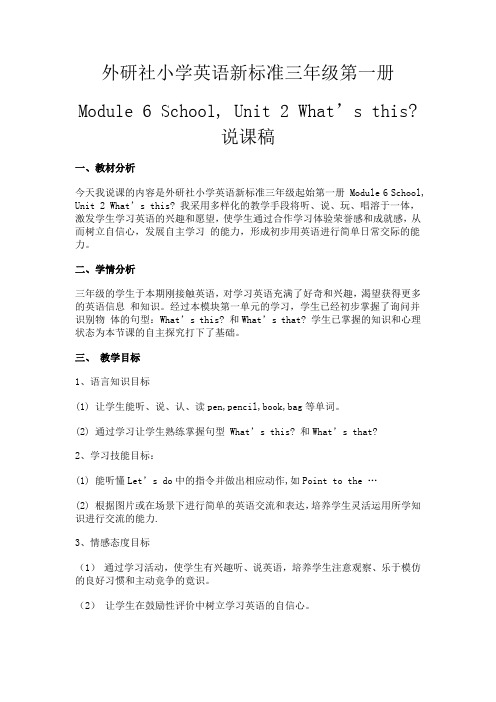
外研社小学英语新标准三年级第一册Module 6 School, Unit 2 What’s this?说课稿一、教材分析今天我说课的内容是外研社小学英语新标准三年级起始第一册 Module 6 School, Unit 2 What’s this? 我采用多样化的教学手段将听、说、玩、唱溶于一体,激发学生学习英语的兴趣和愿望,使学生通过合作学习体验荣誉感和成就感,从而树立自信心,发展自主学习的能力,形成初步用英语进行简单日常交际的能力。
二、学情分析三年级的学生于本期刚接触英语,对学习英语充满了好奇和兴趣,渴望获得更多的英语信息和知识。
经过本模块第一单元的学习,学生已经初步掌握了询问并识别物体的句型:What’s this? 和What’s that? 学生已掌握的知识和心理状态为本节课的自主探究打下了基础。
三、教学目标1、语言知识目标(1) 让学生能听、说、认、读pen,pencil,book,bag等单词。
(2) 通过学习让学生熟练掌握句型What’s this? 和What’s that?2、学习技能目标:(1) 能听懂Let’s do中的指令并做出相应动作,如Poin t to the …(2) 根据图片或在场景下进行简单的英语交流和表达,培养学生灵活运用所学知识进行交流的能力.3、情感态度目标(1)通过学习活动,使学生有兴趣听、说英语,培养学生注意观察、乐于模仿的良好习惯和主动竞争的竟识。
(2)让学生在鼓励性评价中树立学习英语的自信心。
(3)通过小组活动培养学生合作交流能力,从而让学生意识到学习英语的重要意义。
(4)充分利用教材所提供的学习资源,实现自由参与与创新,能主动与他人交流,并克服交流中的困难,使交际顺利进行。
四、教学重难点1、学习新单词 pen,pencil,book,bag ,能正确认读。
2、巩固已学句型:What’s this? 和What’s that? 并能用It’s a…作出相应的回答。
《新标准英语》(一年级起点)第一册
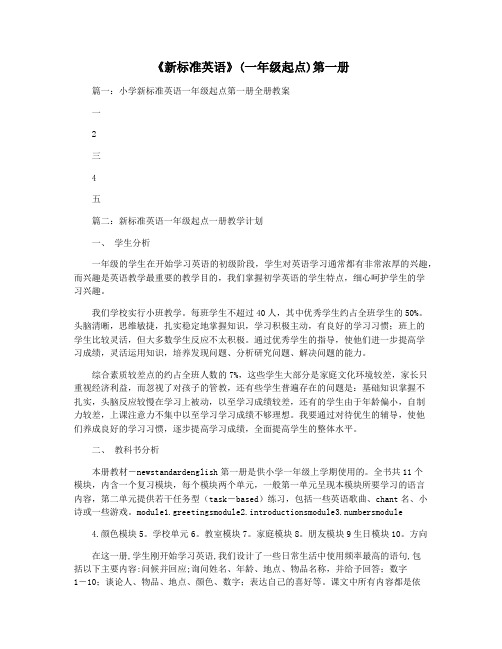
《新标准英语》(一年级起点)第一册篇一:小学新标准英语一年级起点第一册全册教案一2三4五篇二:新标准英语一年级起点一册教学计划一、学生分析一年级的学生在开始学习英语的初级阶段,学生对英语学习通常都有非常浓厚的兴趣,而兴趣是英语教学最重要的教学目的,我们掌握初学英语的学生特点,细心呵护学生的学习兴趣。
我们学校实行小班教学。
每班学生不超过40人,其中优秀学生约占全班学生的50%。
头脑清晰,思维敏捷,扎实稳定地掌握知识,学习积极主动,有良好的学习习惯;班上的学生比较灵活,但大多数学生反应不太积极。
通过优秀学生的指导,使他们进一步提高学习成绩,灵活运用知识,培养发现问题、分析研究问题、解决问题的能力。
综合素质较差点的约占全班人数的7%,这些学生大部分是家庭文化环境较差,家长只重视经济利益,而忽视了对孩子的管教,还有些学生普遍存在的问题是:基础知识掌握不扎实,头脑反应较慢在学习上被动,以至学习成绩较差,还有的学生由于年龄偏小,自制力较差,上课注意力不集中以至学习学习成绩不够理想。
我要通过对待优生的辅导,使他们养成良好的学习习惯,逐步提高学习成绩,全面提高学生的整体水平。
二、教科书分析本册教材―newstandardenglish第一册是供小学一年级上学期使用的。
全书共11个模块,内含一个复习模块,每个模块两个单元,一般第一单元呈现本模块所要学习的语言内容,第二单元提供若干任务型(task―based)练习,包括一些英语歌曲、chant名、小诗或一些游戏。
module1.greetingsmodule2.introductionsmodule3.numbersmodule4.颜色模块5。
学校单元6。
教室模块7。
家庭模块8。
朋友模块9生日模块10。
方向在这一册,学生刚开始学习英语,我们设计了一些日常生活中使用频率最高的语句,包括以下主要内容:问候并回应;询问姓名、年龄、地点、物品名称,并给予回答;数字1―10;谈论人、物品、地点、颜色、数字;表达自己的喜好等。
(完整)外研社小学英语单词表
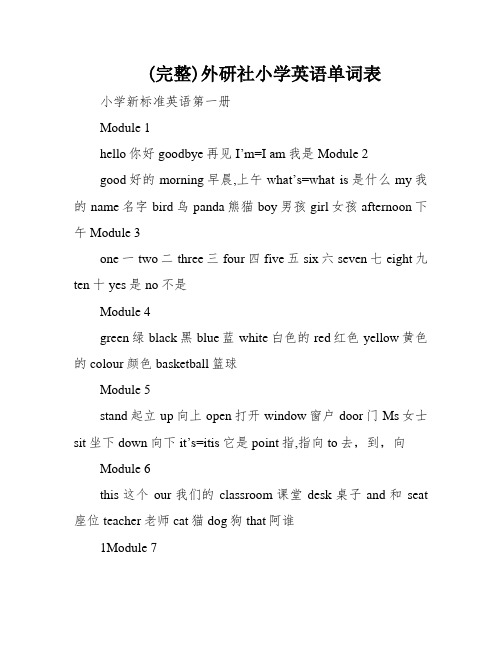
(完整)外研社小学英语单词表小学新标准英语第一册Module 1hello你好goodbye再见I’m=I am我是Module 2good好的morning早晨,上午what’s=what is是什么my我的name名字bird鸟panda熊猫boy男孩girl女孩afternoon下午Module 3one一two二three三four四five五six六seven七eight九ten十yes是no不是Module 4green绿black黑blue蓝white白色的red红色yellow黄色的colour颜色basketball篮球Module 5stand起立up向上open打开window窗户door门Ms女士sit坐下down向下it’s=itis它是point指,指向to去,到,向Module 6this这个our我们的classroom课堂desk桌子and和seat 座位teacher老师cat猫dog狗that阿谁1Module 7school bag书包pen钢笔ruler尺子book书pencil铅笔pencil-box铅笔盒eraser橡皮crayon彩笔Module 8look看fox狐狸kite风筝house房子box盒子Module 9how old几岁you’re=you are你是happy兴奋的for为birthday生日thank感谢welcome欢送Module 10where’s=whereis在哪里in在…里hat帽子on在…上under 在…下bed床balloon气球doll娃娃bear熊第二册Module 1how many多少eleven十一twelve十二orange橙色know晓得other其他的tree树so云云many良多的bird鸟let’s让我们Module2father父亲mother母亲grandpa爷爷,外公grandma奶奶,外婆sister姐妹brother兄弟friend同伙doctor大夫pupil学生he’s=he is他是she’s=she is她是Module3her她的bag包his他的coat外套their他们的nurse护士2dress连衣裙driver司机bus公共汽车Module4head头face脸nose鼻子mouth嘴巴ear耳朵eye眼睛these这些leg腿Module5they’re=theyare他们是cow奶牛farm农场pig猪chicken 鸡egg鸡蛋thin瘦的fat胖的baby幼崽little小的big大的pink粉红的Module6snake蛇long长的zoo动物园short短的tall高的very非常lion狮子cute可爱的scary可怕的Module7play玩football足球like喜爱basketball篮球ping-pong乒乓球hot热的swimming游泳go swimming去游泳dance跳舞tired疲劳的Module8with用together一同favourite出格爱好的sport活动about 关于Module93meat肉noodles面条rice米饭sweets糖果children孩子们ice cream冰激凌Module10here’s=here is这是present礼物sorry对不起的car小汽车第三册Module 1song歌曲jigsaw拼图bike自行车toy玩具Module2T-shirt T恤衫mum妈妈dad爸爸too太small小的shirt衬衫at在party集会clothes衣服trousers裤子shoe鞋Module3we我们have有English英语new新来的Maths数学Music音乐please请play演奏PE体育课Science科学Chinese汉语,语文Art美术Module4o’clock点钟film片子time工夫run跑train火车hungry饥饿的dinner正餐,主餐now现在allright好吧great太好了Module5get up起床go to school上学have lunch吃午餐go home回家4then然后go to bed上床睡觉half半小时past晚于late迟的have breakfast吃早餐Module6watchTV看电视weekend周末read读come来with和……一同OK好listen听Module7park公园too也want想要us我们(宾格)live居住city 城市Module8how若何,若何by乘坐walk步行go to work上班on holiday度假ship船China中国plane飞机love爱Module9winter冬季spring春季wear穿jacket茄克summer炎天autumn秋季sweater毛线衫warm和煦的cool风凉的cold冰冷的Module10NewYear新年eat吃hair头发Christmas圣诞节England英国sing唱第四册Module 1weather天气,天气like像,好像sunny明朗的windy有5风的rain下雨come on快,走吧here在这里snow下雪Module2radio收音机photo照片newspaper报纸camera照相机smile微笑draw画picture丹青write写lettercolour把……涂色彩Module3tidy整理,收拾room房间do做homework家庭作业secret隐秘card卡片flower花today本日Module4noise噪音drink喝,饮talk谈话there在那里game游戏Module5skip跳绳playtime游戏时间sad伤心的no one没有人me我(宾格)hide躲藏seek寻觅hurry up从速catch抓Module6usually通常Sunday星期天help帮助it它(宾格)thing东西ill生病的him他(宾格)her她(宾格)cook烧菜go shopping去购物Module7Children’s Day儿童节play剧some一些say念,背诵poem诗class班级dragondance舞龙picnic野餐fly放(鹞子)sleep睡6Module8up向上hill小山station车站down向下past经过hospital 医院stop停止see看见turn转向around朝着相反方向touch触摸,接触Module9left向左go straight on直着走right向右West Lake Road湖西路excuse me对不起,打搅East Lake Road湖东路factory工场Module10nextto在……旁边infrontof在……的前面cousin堂兄supermarket超市well详细地,熟悉地of course当然第五册Module 1use使用chopsticks筷子hard困难的people人们knife刀fork叉easy容易的hamburger汉堡包chips薯条fast food 快餐Module2make制造cake蛋糕idea主见instead替代lovely可爱的Module3naughty淘气的dragon boat龙舟row划船lake湖feed喂get out离开wet湿的shorts短裤Module47can能winner成功者jump跳far远see看出,觉察Module5shop商店ill生病的biscuit饼干worry担心all全部的Module6computer game电子游戏机careful谨慎的fix修理jigsaw puzzle拼图玩具pet宠物mouse老鼠Module7headache头疼stomach ache胃痛test考试Friday星期五clever聪明的cold感冒cough咳嗽Module8stone石头animal动物elephant大象horse马visit参观man男人woman女人Module9long jump跳远Sports Day运动日high jump跳高race赛跑run a race参加赛跑train driver火车司机taxi driver出租车司机bus driver公交车司机Module10Hong Kong香港airport飞机场sea大海Saturday星期六第六册Module 1nice友善的always总是but但是a bit有一点shy害羞的quiet安静的8loud喧华的helpful有匡助的plus加上twenty二十more 更多的Module2wide宽的old陈腐的London伦敦from来自river河道clock钟high高的new新的round圆的Module3maybe也许tiger山君lots of良多phone打电话Module4writer作家future未来policeman差人Module5fruit水果apple苹果orange橘子peach桃子fourteen十四them他们(宾格)thirteen十三fifteen十五sixteen十六seventeen十七eighteen十teen十九Module6work工作,研究hard努力地speak说话quite相当地good at擅长say表达,写道try努力,尝试fast很快地Module7young年轻的who谁grandparent祖父母old老的then在那时beautiful漂亮的dear亲爱的yesterday昨天fun有趣的Module8second第二floor楼层find找到first第一vegetable蔬菜last上一个milk牛奶9Module9tomorrow明天take带着why为什么day天,日子Monday 星期一after在……之后Tuesday星期二Wednesday星期三Thursday星期四Module10fifty五十thirty三十different不同的sixty六十forty四十eighty八十ninety九十seventy七十hundred百第七册Module 1soon不久tell通知still仍April4月dancing跳舞also也American美国人Module2yesterday今天clean清扫finish完成wash洗dirty脏的Module3learn研究National Day国庆节Module4invent创造paper纸important紧张的printing印刷术print 印刷bicycle自行车Module5went—go去theGreatWall长城saw—see看见ate—eat吃10had—have享用bought—buy买climb爬mountain山wore—wear穿ice-skating溜冰fell over—fall over跌倒hurt受伤learnt—learn研究skate溜冰Module 6gold金子food食物took—take拿走made—make制作angry生气的only只away离开said—say说Module7break弄坏cry哭monster怪物ran—run跑Module8came—come来last刚过去的won—win赢得gold金制的cup奖杯practice练习win赢得Module 9happen产生put—put放ride骑thirsty口渴的watermelon 西瓜fell off—fall off从……跌落knee膝盖cut—cut切,割finger手指Module10matter麻烦事medicine药toothache牙疼fever发烧第八册Module 1machine呆板sir师长教师potato土豆glasses眼镜anything任何东西wait期待duck鸭子grass草地silence平静Module211difficult艰巨的choose选择expensive昂贵的perfect圆满的cheap廉价的cost代价为thousand千Module3shout呼喊wolf狼onceuponatime从前lookafter照看sheep 绵羊bored无聊的village村庄everyone每个人field田地,牧场laugh笑lie谎话,谎言into到……里Module4concert音乐会Chinese中国的CD激光唱盘nervous紧张的before在……之前end结束clap鼓掌proud自豪的when什么时候Module5happen发生Mother’s Day母亲节surprise出乎意料的message消息,祝词special特殊的Module6report报道stick粘贴fantastic极好的meet晤面,调集Module7space太空sun太阳planet行星ring环,环形物moon月亮night夜晚banana香蕉at all根本Module8east东方west西方country国家America美国cousin堂兄弟capital首都Canada加拿大north北方south南方12Module9Australia澳大利亚because由于map舆图language语言back背面的leaves树叶(复数)Module10send寄postcard明片granddad祖父restaurant餐馆much 良多的,非常小学新标准英语第九册单词表Module1year年before以前duck鸭子playground操场Module2heavy重的lift提,抬sell卖出价country国家sometimes有时restaurant饭馆Module 3night夜晚why为甚么Module 4invitation请柬reply回复Module 5mine我的yours你(们)的hers她的his他的both(两者)都whose谁的skirt短裙laugh笑Module 6well好的true真实的point分team队thirty—six36Module 713blind盲的special特别的hear听见fire火inside在……内里safe平安的Module 8line排列morningexercises(复)早操miss想念break休息study研究Module 9bored无聊的nothing没甚么water水Module l0should应该rule规则kind友善的小学新尺度英语第十册单词表Module1drove(drive的过去式)驾驶flute笛子player演奏者office办公室parent父亲;母亲Module2email电子邮件sausage腊肠sandwich三明治delicious鲜味的Module3return清偿borrow借入,借来Module4fine(身体)很好sent (send的过去式)寄get收到,接到chocolate巧克力糖season季节Module514broken破坏的,折断的carry提,背,抱back背部shoulder肩膀;肩部brown棕色的;褐色hand手Module6place中央circle圆,圆圈build制造solve解答,说明hope但愿amazing使人惊讶的thought(think的曩昔式)Module7message息another另外一个clickon收回咔嗒声;点击busy 繁忙的Module8ofcourse固然drew(draw的曩昔式)画piece张、片、块paper纸scissors铰剪(复数)Module9theatre剧院question题目在于men(man的复数体式格局)汉子women(woman的复数体式格局)女人room房间history 汗青Module10ticket票toothbrush牙刷leave离开,动身building建筑物小学新标准英语第十一册单词表(一年级起点)Module1thousand一千,一千个kilometre公里might可能,可以million百万,百万个place地方,地点building建筑物,大楼Module2surprise惊讶everywhere遍地,处处restaurant饭店15different不同的dancing舞蹈weekend周末Module3stamp邮票album集邮册collect收集America美国Canada 加拿大coconut椰子Module4special特殊的,特别的hear听到,听见nearly几乎,接近,差不多present礼物together一同Module5pleased高兴的,满足的address地址penpal笔友pretty摩登的foreign外国的Module6chopsticks(复)筷子difficult困难的city城市answer回覆finish完成,竣事Module7CD-ROM电脑光盘bamboo竹子copy模仿child孩子awake醒的Module8tidy整理,摒挡often常常,常常bookshelf书架choose选择week星期,周Module9peace宁静world天下kangaroo袋鼠16Module10thirsty口渴的bring拿来,带来way体式格局,办法line 排,列小学新标准英语第十二册单词表Module1hotdog热狗waitress女服务生cola可乐dollar美元cent美分enjoy享受,欣赏Module2around在……周围duck鸭子soon不久,快dry干的naughty顽皮的,淘气的Module3funny有趣的,好笑的quickly很快地wet湿的angry生气的,愤怒的shine发光Module4carry(用手、肩等)提,搬supermarket超市party聚会hold拿着fall落下,跌落later稍后,随后away在远处,到远处stairs(常复)楼梯heavy重的Module5clap鼓掌arrive到达Module6space太空travel旅行interested感兴趣的spaceship宇宙飞船model模型17Module7spend度过excited激动的,兴奋的video录像proud高傲的someday未来某一天Module8blind瞎的deaf聋的Module9matter麻烦事baseball棒球team队mistake错误的Module10middle school中学really真正地study研究Geography地理useful有用的student学生scared恐惧。
新标准大学英语1 Unit 2 AR1

Active reading 1: Embarkation
Seafood
Oyster
Oysters were an important food source in all coastal areas where they could be found, and oyster fisheries were an important industry where they were plentiful. Overfishing and pressure from diseases and pollution have sharply reduced supplies, but they remain a popular treat, celebrated in oyster festivals in many cities and towns.
In a Setting French seaside resort My father Character and I
My father asked Plot me to taste an oyster but to me it was nasty.
My father continued persuading me to eat an oyster. Climax Thinking of eating it, I can’t help feeling homesick for my mother’s home baking.
Example: chocolate candy ice cream jiaozi self-service toffee
More
a cup of tea large family meals apples
新标准英语一起二年级上册Module1 Unit2教案
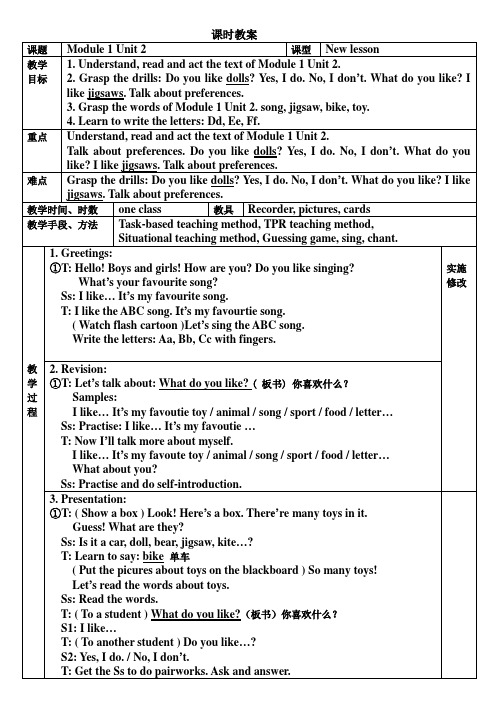
Ss: He likes pandas, toy pandas.
T: Get the Ss to read and act ounsolidation:
①T: ( Put on head ornaments )
Sing the ABC song and point to the letters as you sing them.
④Page 13.Listen, repeat and trace the letters.
( Show cards: Dd, Ee, Ff )
Dd is for dress. Ee is for egg. Ff is for fish.
Ss: I can see …
T: Listen and repeat the story. Then answer my questions.
Does Panpan like dolls?
Ss: No, he doesn’t.
T: What does Panpan like?
Ss: He likes jiasaw. And he likes his bike.
教
学
过
程
1. Greetings:
①T: Hello! Boys and girls! How are you? Do you like singing?
What’s your favourite song?
Ss: I like… It’s my favourite song.
T: I like the ABC song. It’s my favourtie song.
Talk about preferences. Do you likedolls? Yes, I do. No, I don’t. What do you like? I likejigsaws. Talk about preferences.
新标准大学英语2课后翻译答案整理
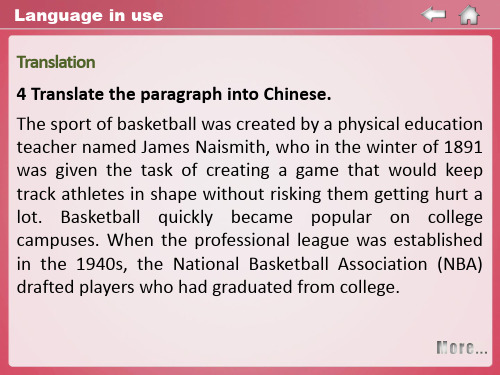
Language in use
这样做对美国职业篮球联赛和大学双方都有好处:大学留住了 可能转向职业篮球赛的学生,而美国职业篮球联赛无需花钱组 建一个小职业篮球联盟。大学篮球在全国的普遍推广以及美国 大学体育协会对“疯狂三月”(即美国大学体育协会甲级联赛 男篮锦标赛)的市场推广,使得这项大学体育赛事一直在蓬勃 发展。
Language in use
5 Translate the paragraph into English.
现在中国大学生参加志愿活动已成为常态。他们到社区为老年 人服务,到山区助学,举办爱心捐赠活动,或到世博会 (World Expo)或奥运会等重要国际活动担任志愿者。参加志 愿活动有助于学生获取专业技能,丰富社会经验,提高道德水 平。多数大学生都认为参与志愿服务是自己应尽的社会责任和 义务,希望能做一些有意义的事情来回报社会,积极推动社会 和谐发展。
Language in use
This was a mutually beneficial relationship for the NBA and colleges — the colleges held onto players who would otherwise go professional, and the NBA did not have to fund a minor league. The pervasiveness of college basketball throughout the nation and the NCAA’ s (美国大 学体育协会) marketing of “March Madness” (officially the NCAA Division I Men’ s Basketball Championship), have kept the college game alive and well.
新标准大学英语1阅读教程1答案(Unit1-Unit2)
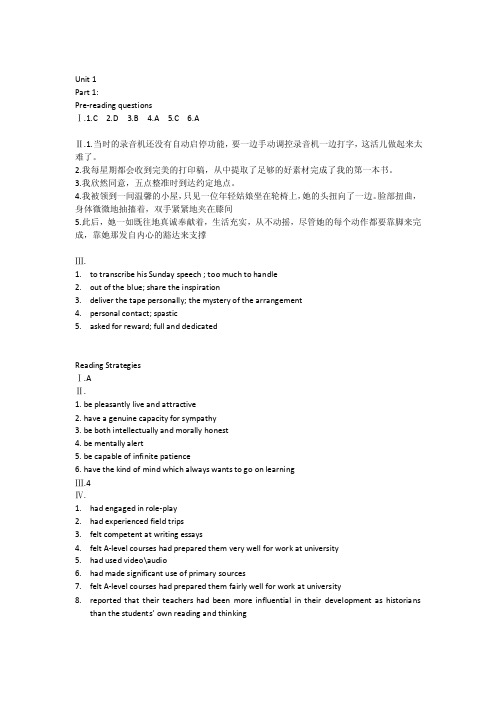
Unit 1Part 1:Pre-reading questionsⅠ.1.C 2.D 3.B 4.A 5.C 6.AⅡ.1.当时的录音机还没有自动启停功能,要一边手动调控录音机一边打字,这活儿做起来太难了。
2.我每星期都会收到完美的打印稿,从中提取了足够的好素材完成了我的第一本书。
3.我欣然同意,五点整准时到达约定地点。
4.我被领到一间温馨的小屋,只见一位年轻姑娘坐在轮椅上,她的头扭向了一边。
脸部扭曲,身体微微地抽搐着,双手紧紧地夹在膝间5.此后,她一如既往地真诚奉献着,生活充实,从不动摇,尽管她的每个动作都要靠脚来完成,靠她那发自内心的豁达来支撑Ⅲ.1.to transcribe his Sunday speech ; too much to handle2.out of the blue; share the inspiration3.deliver the tape personally; the mystery of the arrangement4.personal contact; spastic5.asked for reward; full and dedicatedReading StrategiesⅠ.AⅡ.1. be pleasantly live and attractive2. have a genuine capacity for sympathy3. be both intellectually and morally honest4. be mentally alert5. be capable of infinite patience6. have the kind of mind which always wants to go on learningⅢ.4Ⅳ.1.had engaged in role-play2.had experienced field trips3.felt competent at writing essays4.felt A-level courses had prepared them very well for work at university5.had used video\audio6.had made significant use of primary sources7.felt A-level courses had prepared them fairly well for work at university8.reported that their teachers had been more influential in their development as historiansthan the students’ own reading and thinking1.Despite her blindness, the author’s mother never fails to amaze her children with herknowledge of what is going on around her. For them she seems to know everything2.The moment she touched the dead bird, she screamed and drew back her hand immediately.Then she ordered the author and the bird outside and admonished her never to let her touch such a thing again.3.She was aware of the dog’s presence because she heard its toenails clicking on the bedroomfloor4.She was trying to tell her children that she knew everything about them and loved them, theway every mother knew and loved her children. Besides she wanted to show her children that she was also rearing them with her mind’s eye.5.This is because her mother is great. She shows that a blind person can also have dignity,character, wisdom, as well as a great love and devotion for her family. The author is in fact proud of her motherPart 31. F2.T3. F4. F5.T6. C7. D8. A9. E10.B11.E12.D13.B14.C15.A16.C17.B18.D19.C20.A21.D22.E23.C24.BUnit2PartⅠ:ExercisesⅠ1-6 ADBCACⅡ 1.我当时19岁,是德克萨斯大学的学生,一帆风顺,正在实现我的“梦想”—成为一名整形外科医生。
新标准英语(一年级起点)第一册Module 2 Unit 2
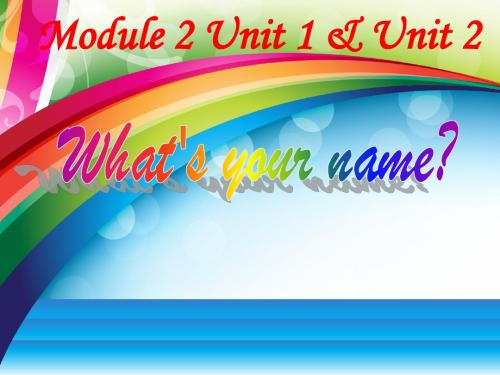
I’m Lingling. I’m Lingling.
Hello, bird. Hello, bird. What’s your name? What’s your name?
Module 2 Unit 1 & Unit 2
How are you? How are you? How are you? How are you?
I’m fine, thank you. I’m fine, thank you.
What’s your name?
My name’s + 名字. / I’m +名字.
I’m a boy and you are a girl.
Stand up! Stand up!
Sit down! Sit down!
Open your book! Open your book! Close your book! Close your book!
Follow follow follow me. (双手从左往右拍四下) Hands up , hands down. (双手头上举晃腕,向下晃腕) Follow follow follow me. (双手从左往右拍四下) Stand up. Sit down. (起立,坐下) Oh lei ,oh lei ,oh lei (双手头上晃两下) Go go go (左手叉腰,右手握拳上举三次)
Tweet-tweet! Tweet-tweet!
Hi, Tweet-tweet! Hi, Tweet-tweet! Ha ha…
新标准大学英语 综合教程1 笔记unit2
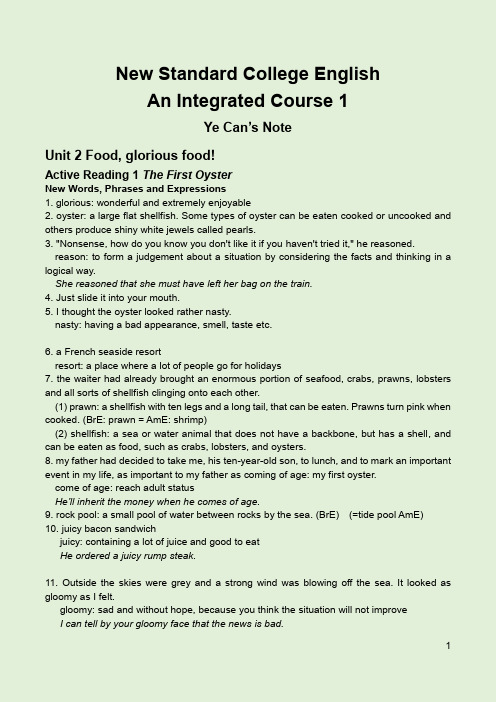
New Standard College EnglishAn Integrated Course 1Ye Can’s NoteUnit 2 Food, glorious food!Active Reading 1 The First OysterNew Words, Phrases and Expressions1. glorious: wonderful and extremely enjoyable2. oyster: a large flat shellfish. Some types of oyster can be eaten cooked or uncooked and others produce shiny white jewels called pearls.3. "Nonsense, how do you know you don't like it if you haven't tried it," he reasoned. reason: to form a judgement about a situation by considering the facts and thinking in a logical way.She reasoned that she must have left her bag on the train.4. Just slide it into your mouth.5. I thought the oyster looked rather nasty.nasty: having a bad appearance, smell, taste etc.6. a French seaside resortresort: a place where a lot of people go for holidays7. the waiter had already brought an enormous portion of seafood, crabs, prawns, lobsters and all sorts of shellfish clinging onto each other.(1) prawn: a shellfish with ten legs and a long tail, that can be eaten. Prawns turn pink when cooked. (BrE: prawn = AmE: shrimp)(2) shellfish: a sea or water animal that does not have a backbone, but has a shell, and can be eaten as food, such as crabs, lobsters, and oysters.8. my father had decided to take me, his ten-year-old son, to lunch, and to mark an important event in my life, as important to my father as coming of age: my first oyster.come of age: reach adult statusHe’ll inherit the money when he comes of age.9. rock pool: a small pool of water between rocks by the sea. (BrE) (=tide pool AmE)10. juicy bacon sandwichjuicy: containing a lot of juice and good to eatHe ordered a juicy rump steak.11. Outside the skies were grey and a strong wind was blowing off the sea. It looked as gloomy as I felt.gloomy: sad and without hope, because you think the situation will not improveI can tell by your gloomy face that the news is bad.12. striking a note of compromiseTo strike a note of something means to speak in a particular manner or tone.compromise: an agreement made between two people or groups in which each side gives up some of the things they want so that both sides are happy at the end13. the clear perception14. On his plate was a pile of discarded lobster claws, and alongside was a battery of implements used to crack the shells, and scrape out every last piece of meat.(1) discard: get rid of sth. because it is uselessdiscard an old pair of shoes / discard old beliefs(2) a battery of: a group of many things or people of the same typea battery of medical tests(3) implement: a tool or instrument, especially a fairly large one with no motor, especially one used for outdoor physical workagricultural implements15. He paused every mouthful and raised his glass. Now and then he waved the oyster at me, teasing me to eat it.(1) mouthful: an amount of food or drink that you put into your mouth at one timeHe took a mouthful of sweet country air.I'm so full I couldn't eat another mouthful.handful: the amount of sth that can be held in one handarmful: a quantity that you can carry in one or both arms(2) now and then: at times, occasionally(3) tease: to laugh at someone and make jokes in order to have fun by embarrassing them, either in a friendly way or in an unkind wayShe used to tease me about my hair.16. I just looked at my empty plate in despair.despair: a feeling that you have no hope at all for the futureDefeat after defeat filled us with despair.17. a silent tear slid down my cheek.slid: pt of slide18. I knew it was all over.19. I took it between a finger and thumb, and held it to my lips.20. I did as I was told.21. The oyster was slippery.slippery: difficult to hold or to stand on or walk on, because it is smooth, wet or greasy.slippery like a fishThe road was slippery after the rain.22. half smilingKey Words1. portionn.(1) a part of something larger, especially a part that is different from the other partsThe factory represents only a small portion of the company’s interests.The rent on his portion of the apartment was $500 a month.The front portion of the rocket breaks off.(2) an amount of food for one person, especially when served in a restaurantShe cut the cake into six small portions.a huge portion of roast beefHe served generous portions of soup from the pot.(3) a share of something, such as responsibility, blame, or a duty, that is divided between a small number of peopleThe other driver must bear a portion of the blame for the accident.2. clingv.(1) to stick to someone or something, to fit very tightly on somethingHis wet shirt clung to his body.(2) to hold someone or something tightly, especially because you do not feel safesurvivors clinging to a raftcling to old ideasShe clung to the hope that her son was not dead.3. perceptionn.(1) the way that you notice things with your senses of sight, hearing etcvisual perceptionHis perception of the change came in a flash.(2) the natural ability to understand or notice things quicklyHis analysis of the problem showed great perception.(3) the way you think about something and your idea of what it is likeParents’ views influence their children’s perceptions of the world.public perception of the police / doctorThere is a general public perception that…4. crackvt./vi.to break or to make something break, either so that it gets lines on its surface, or so that it breaks into piecesHe cracked a couple of eggs into a pan.He has cracked a bone in his arm.Don’t put boiling water in the glass or it will crack.Concrete is liable to crack in very cold weather.Her lips were dry and cracked.5. scrapev.(1) to remove something from a surface by moving sth sharp and hard like a knife across itScrape the carrots and slice them thinly.(2) to rub against a rough surface by accident so that it causes slight damage or hurtI must have scraped some of the paint off when I was parking the car.She fell and scraped her knee.Notes1. district / region / vicinity / area,这一组名词都有“区域”的意思。
新标准大学英语综合教程2课件
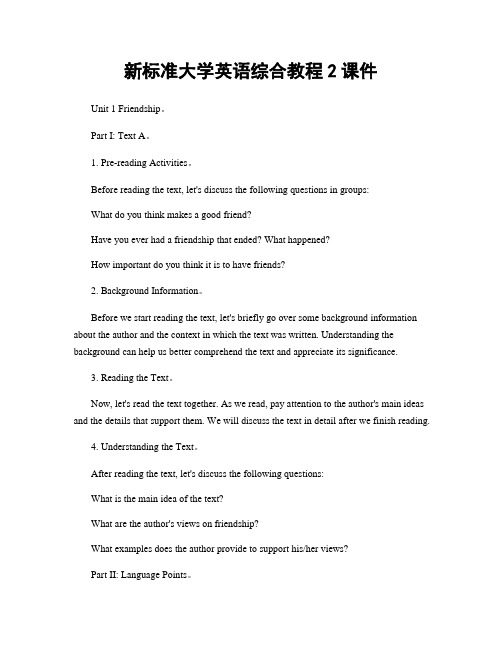
新标准大学英语综合教程2课件Unit 1 Friendship。
Part I: Text A。
1. Pre-reading Activities。
Before reading the text, let's discuss the following questions in groups:What do you think makes a good friend?Have you ever had a friendship that ended? What happened?How important do you think it is to have friends?2. Background Information。
Before we start reading the text, let's briefly go over some background information about the author and the context in which the text was written. Understanding the background can help us better comprehend the text and appreciate its significance.3. Reading the Text。
Now, let's read the text together. As we read, pay attention to the author's main ideas and the details that support them. We will discuss the text in detail after we finish reading.4. Understanding the Text。
After reading the text, let's discuss the following questions:What is the main idea of the text?What are the author's views on friendship?What examples does the author provide to support his/her views?Part II: Language Points。
《新标准英语》(一年级起点)第一册[修改版]
![《新标准英语》(一年级起点)第一册[修改版]](https://img.taocdn.com/s3/m/fad6c33308a1284ac85043f0.png)
第一篇:《新标准英语》(一年级起点)第一册《新标准英语》(一年级起点)第一册篇一:小学新标准英语一年级起点第一册全册教案1 2 3 4 5 篇二:新标准英语一年级起点一册教学计划一、学生分析一年级的学生在开始学习英语的初级阶段,学生对英语学习通常都有非常浓厚的兴趣,而兴趣是英语教学最重要的教学目的,我们掌握初学英语的学生特点,细心呵护学生的学习兴趣。
我们学校实行小班化教学,每班学生不超过40人,其中优秀生大约占全班人数的50%,他们头脑清晰,思维敏捷,对知识的掌握扎实、稳固,能够在学习上积极主动,有良好的学习习惯;多数学生中等,这部分学生反应灵活,理解力较强,但课堂纪律稍差。
我要通过对优秀生的辅导,使他们进一步提高学习成绩,对所学知识能灵活运用,培养他们发现问题,分析研究问题,解决问题的能力。
综合素质较差点的约占全班人数的7%,这些学生大部分是家庭文化环境较差,家长只重视经济利益,而忽视了对孩子的管教,还有些学生普遍存在的问题是:基础知识掌握不扎实,头脑反应较慢在学习上被动,以至学习成绩较差,还有的学生由于年龄偏小,自制力较差,上课注意力不集中以至学习学习成绩不够理想。
我要通过对待优生的辅导,使他们养成良好的学习习惯,逐步提高学习成绩,全面提高学生的整体水平。
二、教材分析本册教材—New Standard English 第一册是供小学一年级上学期使用的。
全书共11个模块,内含一个复习模块,每个模块两个单元,一般第一单元呈现本模块所要学习的语言内容,第二单元提供若干任务型(Task —based)练习,包括一些英语歌曲、chant名、小诗或一些游戏。
Module 1. Greetings Module 2.Introductions Module 3. Numbers Module 4. Colours Module 5. School Module 6. Classroom Module 7. Family Module8. Friends Module9 Birthday Module10.Directions 在这一册,学生刚开始学习英语,我们设计了一些日常生活中使用频率最高的语句,包括以下主要内容:问候并回应;询问姓名、年龄、地点、物品名称,并给予回答;数字1—10;谈论人、物品、地点、颜色、数字;表达自己的喜好等。
新标准英语一起二年级上M2U1教案
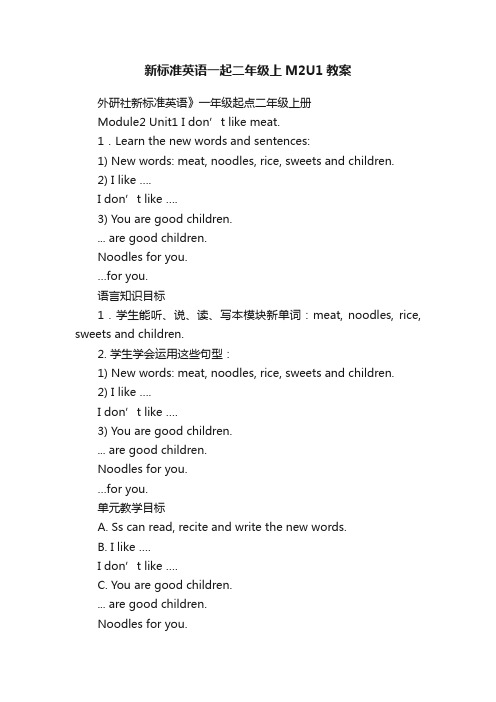
新标准英语一起二年级上M2U1教案外研社新标准英语》一年级起点二年级上册Module2 Unit1 I don’t like meat.1.Learn the new words and sentences:1) New words: meat, noodles, rice, sweets and children.2) I like ….I don’t like ….3) You are good children.... are good children.Noodles for you.…for you.语言知识目标1.学生能听、说、读、写本模块新单词:meat, noodles, rice, sweets and children.2. 学生学会运用这些句型:1) New words: meat, noodles, rice, sweets and children.2) I like ….I don’t like ….3) You are good children.... are good children.Noodles for you.…for you.单元教学目标A. Ss can read, recite and write the new words.B. I like ….I don’t like ….C. You are good children.... are good children.Noodles for you.…for you.教学重点1. 正确使用I like ….I don’t like ….教学难点You are good children.... are good children.注意单复数形式。
Noodles for you.…for you.注意区分candy与sweets。
(The First Period)Teaching stepsStep 1 Warm-upSing the song and do the actions: ABC song.2. Sing the chant: I like candy.I don’t like cake.Step 2 Presentation1. PPT shows the words.Candy and sweets, distinguish the meaning of them. Learn the new words: sweets, meat, noodles and rice.2. Distinguish the words: child and children. (单复数) Example: Tracy is a child.Tracy and Tom are children.Ss try to make sentences.3. Bb: I am a child.You are a child. You are children.He is a child. She is a child.We are children.… is a child.… and … are children.4. Ss make sentences on the exercise books.Step 3 PracticeOpen the English books, page8-9, listen the dialogues, watch the short video and repeat the dialogues.Read the dialogues follow the teacher, read it together.T and Ss read the dialogues.Pair work read the dialogues.Boys and girls read the dialogues.Read it together.Try to recite.Homework:Read the book on page 8-9.Read and spell the words.Copy the words: sweets, meat, rice, noodles and children.(The Second Period)Teaching steps:Step 1. RevisionGreeting: Good morning, how are you?Sing the chant: I like rice.I don’t like noodles.Step2. Presentation1. Review the words: sweets, noodles, rice, meat and children.Try to spell and recite.2. PPT shows the things we learned.Ss say the sentences: I like ….I don’t like….Groups match.3. Review the sentences: I am a child.You are a child. You are children.He is a child. She is a child.We are children.… is a child.… and … are children.4. Each group gives a report.Step 3 practice1. P8-9, read and recite the dialogues.P10, read.2. Make sentence with partners.I like ….I don’t like ….…is a good child.…and … are good children.Copy the sentences.3. Make the sentences on the exercise books.HomeworkListen to the tape, read and recite the dialogues.Recite the words: song, come on, team, sweets, noodles, rice, meat and children.(The Third Period)Unit2 I don’t like ginger.Teaching steps:Step1. 1. Chant: Noodles and rice are very, very nice.Mm, mm, mm, very, very nice!RevisionRecite the words.Recite the dialogues on p8-9.Step2. Presentation1. PPT shows the pictures about the new words: ginger, onion,nice and ice cream. Read the new words group by group, two by two, one by one.Try to spell and recite.2. Listen to the dialogues, watch the short video and repeat. Read the dialogues together, boys and girls.Try to recite it.3. Pair work: Act the dialogues out by Ss.Step 3 Practice1.English books p12, part3 listen and practice.2.Part4 listen and say, chant.Copy the sentences on the exercise books.3. Practice the writing of the letters.Homework:Listen to the tape and read the p11.Write the sentences on p12 part4.(The Fourth Period)Teaching steps:Step 1. Warming-up1. Greetings2. Sing the chant, Noodles and rice are very, very nice.Mm, mm, mm, very, very nice!Step 2. Presentation1. Show the new words.Way: 1) look my mouse and guess, which word.2) High and low voice.3) Two groups to read.2. I like football, I don’t like ginger.What do you like?Practice to ask their partners and other friends.Practice on p13, part6.Pare work, show the dialogues.3.Practice the p13, part7.I don’t like ….I like ….Some … for you.Homework:1. Recite the dialogues p11.2. Copy the words: ginger, onion, nice and ice cream. Spell and recite the words.(The Fifth Period)Review and finish the coaching paper.Step 1 RevisionGreetings, review the words and dialogues.Step 2 Do the newspapers.。
小学新标准英语三年级上册Module1 Unit2

Sam is using his hands. He’s eating sweets.
Check the Ss’ answers. Then point and say.
②T:Now let’s relax. Let’s play a guessing game.
T: Can she use chopsticks?
Ss: No, she can’t.
T: Why?
Ss: Because Amy is English. Chopsticks are hard for her.
②T:Now let’s review the text of . M1 U1.
Read between groups.
For example:
A: What is Lingling doing?
B: She’s eating noodles.
A: What is she using?
B: She’s using chopsticks.
Ss: Do pair works. Ask and answer.
4. Consolidation:
_____ is Chinese fast food.____ and ____are English fast food.自我评价领 Nhomakorabea导
审
阅
①T:Workbook. Page 4. 1. Listen and match.
Daming is using chopsticks. He’s eating rice.
Lingling is using chopsticks. She’s eating noodles.
小学-英语-外研新标准(一起)-Module2
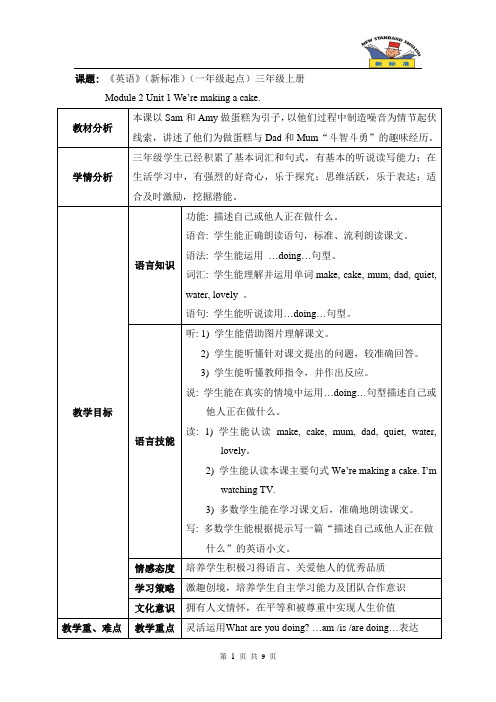
课题: 《英语》(新标准)(一年级起点)三年级上册Module 2 Unit 1 We’re making a cake.教材分析本课以Sam和Amy做蛋糕为引子,以他们过程中制造噪音为情节起伏线索,讲述了他们为做蛋糕与Dad和Mum“斗智斗勇”的趣味经历。
学情分析三年级学生已经积累了基本词汇和句式,有基本的听说读写能力;在生活学习中,有强烈的好奇心,乐于探究;思维活跃,乐于表达;适合及时激励,挖掘潜能。
教学目标语言知识功能: 描述自己或他人正在做什么。
语音: 学生能正确朗读语句,标准、流利朗读课文。
语法: 学生能运用…doing…句型。
词汇: 学生能理解并运用单词make, cake, mum, dad, quiet,water, lovely 。
语句: 学生能听说读用…doing…句型。
语言技能听: 1) 学生能借助图片理解课文。
2) 学生能听懂针对课文提出的问题,较准确回答。
3) 学生能听懂教师指令,并作出反应。
说: 学生能在真实的情境中运用…doing…句型描述自己或他人正在做什么。
读: 1) 学生能认读make, cake, mum, dad, quiet, water,lovely。
2) 学生能认读本课主要句式We’re making a cake. I’mwatching TV.3) 多数学生能在学习课文后,准确地朗读课文。
写: 多数学生能根据提示写一篇“描述自己或他人正在做什么”的英语小文。
情感态度培养学生积极习得语言、关爱他人的优秀品质学习策略激趣创境,培养学生自主学习能力及团队合作意识文化意识拥有人文情怀,在平等和被尊重中实现人生价值教学重、难点教学重点灵活运用What are you d oing? …am /is /are doing…表达教学难点灵活运用常见动词词汇或词组,准确说出其-ing形式教学准备外研通点读笔互动教学系统、教材、头饰、卡片环节与时间教学过程资源应用说明热身/复习导入(3分钟)1. Greeting.2. Singing a song ‘If you are happy’.歌曲来源于网络、展示PPT第2页。
配套新教材 高中英语 北师大版 必修第一册 U2 LESSON 2 RULES OF THE GAME

(4) [词汇复现] You can turn to the expert if you have any problems.
完成句子 (5) [词汇复现] He
turned off
(关掉)his mobile phone to apply himself entirely to
his study. (6)We thought it was going to rain;it turned out to be (结果是) a fine day.
relation n. 关系,联系 relative n. 亲戚 adj. 相关的
高中英语 必修第一册 UNIT 2 SPORTS AND FITNESS
单句语法填空 (1) The theme of the dialogue should be related to the theme of the reading passage. (2)He suffers from great pain related (relate)to his mental disease. (3)It is difficult to relate these results to any known cause. 完成句子 (4) [词汇复现] Experts believe that a large number of cancer cases in the area
I don’t think I’ll need any money but I’ll bring some just in case. 我想我不会用到钱的,不过我还是要带一些以防万一。 Take an umbrella,in case it rains. 带把伞吧,以防下雨。 In case I’m late,start without me.假如我来晚了,你们就别等我先开始吧。 【归纳拓展】 in no case 绝不(位于句首时句子用部分倒装) in any case 无论如何,不管怎样 in case of 假使,如果 in some cases 在某些情况下 in this/that case 既然这样 / 那样;在这种 / 那种情况下 It is often the case that... 通常情况下…… as is often the case(with...)(对……)是常有的事
- 1、下载文档前请自行甄别文档内容的完整性,平台不提供额外的编辑、内容补充、找答案等附加服务。
- 2、"仅部分预览"的文档,不可在线预览部分如存在完整性等问题,可反馈申请退款(可完整预览的文档不适用该条件!)。
- 3、如文档侵犯您的权益,请联系客服反馈,我们会尽快为您处理(人工客服工作时间:9:00-18:30)。
新标准英语第二册期总测试卷
一.读一读,练一练
1. head
2. father 妈妈
face mother 弟弟哥哥
nose grandma 爸爸
mouth grandpa 爷爷外公
ear sister 朋友
eye brother 奶奶外婆
leg friend 小学生
pupil 孩子们
children 朋友
3.
This is a nurse. This is her coat.
This is a doctor. This is her coat.
This is a driver. This is his bus.
This is a teacher. This is his bag.
3.bird 鸡long football
pig 蛇tall
chicken 鸟short basketball
baby 狮子scary
snake 幼崽cute ping-pong
lion 猪thin
fat swimming
big
short dance
\
4. rice orange 粉色
know 农场
noodles these 特别喜爱的
coat 一起
bag 玩
meat dress 这些
pink 外套
eggs farm 包
play 礼物
ice cream like 关于
favourite 桔色
sweet together 连衣裙
about 知道
present 喜欢
5.Let’s =let us 这是
He’s=he is (她、他、它)们是
She’s=she is 她是
They’re=they are 他是
Here’s=here is 让我们
二.根据问句选答句
1.Is it under the bed ? Red.
How mang birds in the tree ? Yes, I do.
What are they? They are cows.
What’s your favourite colour? Yes,it is.
Dou you like cars? Twelve.
2.选择正确的汉语意思
Look at the tree. So many birds. 给你面条。
That is my grandpa and that is my grandma. 长颈鹿很高。
He’s a driver. That's is his bus. 看那棵树。
那么多鸟。
What are these? 我最喜欢的运动时打篮球。
The giraffes are tall. 那是我的爷爷和奶奶。
The baby lion is cute. 我不喜欢洋葱。
Let’s play with your football. 你是一个好孩子么?
My favourite sport is basketball. 这些是什么?
Noodles for you. 他是一名司机。
那是他的公共汽车。
Are you a good boy? 让我们玩你的足球吧。
I don’t like ginger. 狮子幼崽很可爱。
三、情景交际
1.你过生日,小明给你送来了礼物,你应该说:
A What’s your favourite colour?
B Thank you.
2. 玲玲想知道树上有多少只鸟.应该问:
A What are the birds?
B How many birds?
3. 动物园里你看见了狮子宝宝很可爱,应该说:
A The baby lions are cute.
B The mother lion is cute.
4. 如何告诉小朋友,这是你的妈妈。
A This is my mother .
B This is your mother.
5.你看见地上有许多的东西,但是不知道什么。
应该说:
A What’s this?
B What are these?
6.如果你生病了,你可以找他,他是。
A He’s a doctor.
B She’s a driver
7.出去玩的时候,你热了,应该说:
A I’m hot.
B I’m tired
8.你想请朋友一起去唱歌,你应该说。
A Let’s sing.
B What’s this?
9.你不知道远处那件物品的名字,你应该说
A What is this.
B What’s that.
10.想问一件物品的颜色,你应该问。
A What colour is it?
B Is that a bike
11.你想告诉别人你不喜欢糖果,你应该说。
A I like sweets.
B l don’t like sweets.
12.当你想知道他们是否喜欢乒乓球,你会说。
A Do they like ping-pong.
B Do you like ping-pong.
13. 你想给对方米饭,你会说。
A Rice for you.
B l like rice.
14当你看到很多的奶牛,你会惊叹:
A How many cows?
B So many cows!。
